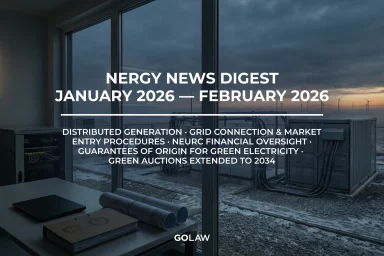Compensation for curtailments of renewable generation in Ukraine
As of November 2019, certain RES producers have been intermittently forced to reduce their output or halt production of electrical energy altogether under the commands of Ukraine’s transmission system operator, NEC Ukrenergo. DTEK, along with several other large market players led the call for limitations. Many of the country’s RES producers have become alarmed.
According to current legislation, the transmission system operator is obliged to, and has the right, to balance Ukraine’s energy system. This includes enforcing a reduction, or completely stopping electricity production.
Such commands are selectively applied to different RES producers. Big generation stations with a capacity of 50 MW or more are usually targeted because, in the opinion of the transmission system operator, their curtailment can help to instantly balance the system and quickly resolve the operational security issue.
The right to place curtailment orders in relation to RES producers may be applied by the transmission system operator in case when options to reduce the workload of all other market participants have been used by the transmission system operator.
Furthermore, the law establishes that the value of all the electricity that was not generated due to the curtailment must be reimbursed in full to the RES producer, in accordance with either the established “green” tariff or the auction price (whichever is applicable).
However, no by-laws have been adopted to regulate the procedure for curtailment compensations. For instance, as of today neither rules to calculate the amount of the electricity that could be produced by a specific energy source, nor the sources from which respective compensations shall be made, are available.
The position of the transmission system operator has been that absence of the respective detailed order on curtailment compensation shall be the basis for no reimbursements for RES producers.
Such an approach is not acceptable for the market players. In response, they have asked to discuss and regulate the matter together with the transmission system operator.
As the result of several months of work, a methodology for calculating unprocessed electricity has been developed and filed to the regulator for approval:
- Sources of funds for curtailment compensation will comprise the transmission system operator’s transmission tariff and placed within a fee for an increase of the share of electricity produced from RES’ as its component.
- The curtailment compensation will be reimbursed by the Guaranteed Buyer within imbalance settlement arrangements in its balancing group. Amount of curtailment compensation shall be based on lost output calculated in accordance with the methodology for curtailment calculation and “green” tariff approved by the regulator for the respective RES producer. In turn, the Guaranteed Buyer and the RES producers shall conclude contracts on reimbursement for the share of service cost for electricity imbalance settlement. After introduction of responsibility for imbalances, the RES producers will receive curtailment compensation reduced by the amount of imbalances payment due by them.
- Methodology for curtailment calculations will establish specifics of curtailment calculations for different RES technologies, in particular, daily generation patterns, weather conditions, etc.
Critical issues
The draft methodology is currently being processed by the regulator. However, another critical issue for RES producers has surfaced.
In the course of negotiations between the Ukrainian Government and RES producers on the feed-in tariff restructuring schemes, the government appears to have discovered a weak point in the curtailment compensation clauses, which allows it to manipulate them to make RES producers apply voluntary restructuring.
Namely, it is suggested that those RES producers that do not agree to the feed-in tariff restructuring will not be entitled to curtailment compensation. It is worth mentioning that no capped amount of possible curtailments will be prescribed. Those RES producers that do agree to restructuring will be entitled for curtailment compensation.
Regardless of whether RES producers and the government reach a consensus on the FIT restructuring, it is expected that the draft law on changes to Ukraine’s renewable legislation will be filed to the parliament no later than the end of May. Currently, all sector market players have frozen in anticipation and are hoping for the least harmful scenario.
The article has been published at PV Magazine website
Sign up to be aware
New achievements are inspired by information. GO further, don’t miss out GOLAW news and legal alerts
Our expertise
-
- Energy and Natural Resources
- Antitrust and Competition
- Banking and Finance
- Compliance, Corporate Governance and Risk Management
- Corporate and M&A
- Criminal and White Collar Defence
- Defense in Anti-corruption procedures and regulations
- Private: Digital Economy Practice
- Labor and Employment
- Natural Resources and Environment
- Government Relations (GR)
- Insolvency and Corporate Recovery
- Intellectual property
- International trade
- Legal support of business and private Сlients in Germany
- Litigation and dispute resolution
- Private clients
- Real Estate and Construction
- Restructuring, Claims and Recoveries
- Martial Law
- Tax and Customs
- Private: Digital Economy Practice
-
- Agribusiness
- Aviation
- Chemical industry
- Engineering, Construction and Building Materials
- Environment and Natural Resources
- Financial institutions
- IT and AI
- Industry and manufacturing
- Healthcare industries, Life sciences and Pharmaceuticals
- Media, Entertainment, Sports and Gambling
- Retail, FMCG and E-Commerce
- Transport and Logistics
We use cookies to improve performance of our website and your user experience.
Cookies policy
Cookies settings







